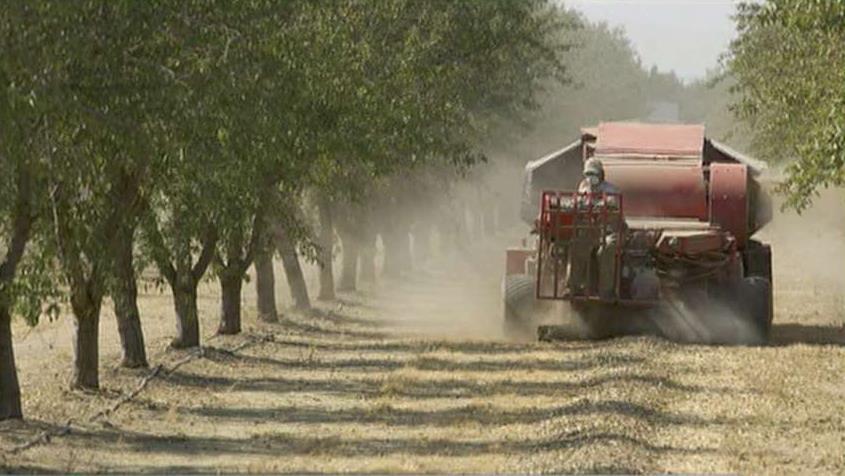Trump tariffs: California almond growers say China, US stand to lose
Almond growers in Kern County, California, are the world’s largest exporter of almonds – and China’s latest tariff target.
As Beijing swaps barbs with the White House over trade, farmers are caught in the middle.
“We’re certainly collateral damage,” Mike Young, a partner at Wegis Ranch, tells FOX Business.
Young says Wegis exports 195 million pounds of almonds to China every year – and it’s already seeing the impact of trade tensions
“The buyers in China are kind of already implementing the tariffs themselves,” Young says.
But not every grower sees the impact of tariffs the same way. Jim Neufeld, senior partner at Lester Neufeld & Son, says China is just one part of the equation.
The impact of these tariffs will hit the industry in the short term, but he doesn’t see these tariffs as a long-term problem because they would be bad for both countries.
“The first thing you always think of is we’re completely going to be cut off from China,” Neufeld says. “I don’t think that’s going to completely happen. The impact is going to be temporary but not long-term. China doesn’t want that either as far as the consumers are concerned.”
Young agrees that tariffs are bad for China.
“This not only hurts the American farmer but it hurts the China consumer,” he says. “Not only will it hinder supply a little bit but their cost of food is going to go up.”
Neufeld says he’s more concerned that this trade fight could have a ripple effect on trade relationships with other countries.
“There is a danger there that this thing could explode into something none of us like,” he says. “But by the same token, I don’t think that’s going to happen in the end.”
Growers are hoping the trade dispute ends before it does too much damage to the economy,” according to Holly King, chair of the Almond Board of California.
“Let’s resolve this quickly,” she tells FOX Business. “It’s an important market for the state and the nation. We are a $21 billion contribution to California’s economy, and we create a significant amount of jobs. It not only concerns us but should be a concern to the state and the nation as well.”
Almond growers say Australia, the world’s second largest producer, stands to benefit the longer this dispute drags on – at least for the short term.
“They’ve a got zero-trade, zero-tariff agreement with China,” Young says. “It’s certainly going to cut into our supply.”
Young says Australia will see a boom in demand for its crops but not for long.
“They can’t supply everything to the Chinese market,” he says. “We’re still going to have that opportunity.”
Young says Australia will have to pull out of other markets to meet China’s demand and that can create an opening for almond growers in California to expand.
“What Australia supplies right now, they’re going to have to take away from other places,” Young says. “And we should be able to backfill those areas. So it’s not going to hurt but it’s not going to help.”
Young says the biggest impact to growers under the tariffs is the lack of a marketplace.
“We are going to have to develop new marketplaces to sell our crop,” he says.
Young says almond growers in California will look to other countries.
“Those are untapped markets that we can tap into – places where Australia currently sells, where they might have to pull product away from,” he says.
Growers are looking to backfill in other parts of southeast Asia, Indonesia and South Korea, according to Young.
Even if the trade talks lead to a better deal, growers don’t want to be put in the middle of a trade tug-of-war between the White House and Beijing.
“Our product is used along the way to achieve something else, and we’d like to kind of get out of that path,” says King.
Young adds: “The end goal ultimately for the U.S. is going to be a good thing. Do I like to be the punching bag because of it? No, not at all.”




















